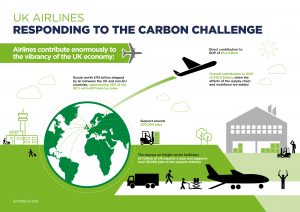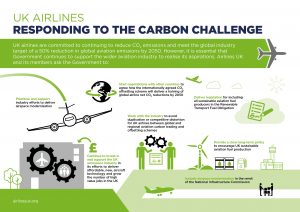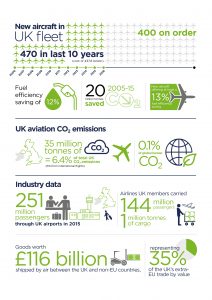Speech by Secretary of State for Transport at Airlines UK Annual Dinner
INTRODUCTION
Good evening.
It’s a pleasure to join you for tonight’s dinner.
It’s also a welcome opportunity for me to talk a little about the progress we’ve made on aviation during my first six months as Transport Secretary.
As many of you will know, this is a job that I’ve always wanted to do.
In my first six months I’ve already had the pleasure of meeting many people in this room, in what’s been a very exciting time for aviation.
One of my first acts as Secretary of State was to make a long awaited big decision: giving London City Airport the opportunity to expand.
And this is a government prepared to make other big decisions – including the location on aviation expansion in the south east, recommending a third runway at Heathrow.
More on that later.
BREXIT
Because I’d like to start by saying a few words about Brexit.
I understand that you are keen to hear exactly what Brexit will entail for the airline industry.
My priority right now is to secure the right deal for airlines following negotiations with the rest of the EU.
At the same time, I will be working alongside the Prime Minister and my colleagues in the Cabinet to provide as much clarity as possible, as early as possible.
It was in that spirit that Theresa May used her speech last week to make clear our intention to have an open trading relationship with the EU when we leave.
We will be pushing for a new, comprehensive, free trade agreement, giving us the best possible access to the single market.
We also want the best possible access to European aviation markets.
We believe it is in the EU’s interests to seek a liberal arrangement for aviation.
So that airlines can offer connectivity.
And passengers have choice.
Of course, the ultimate outcome for airlines – as for all areas of the economy – will have to await the conclusion of negotiations.
Yet as discussions with the EU proceed, I am confident that we will get what we need.
The fact remains that other countries want to do business with us.
That’s why among the major developed nations we have the world’s best performing economy.
And those nations want to do business with British airlines too.
Far from the gloomy forecasts that some economic commentators made in the summer, Britain ended last year as the strongest of the world’s advanced economies.
Growth didn’t just remain steady in the six months after the Brexit vote.
It accelerated.
Business activity hit a 17 month high in December.
Showing that confidence in our economy remains undiminished.
That’s because the June vote wasn’t just a vote to leave the European Union.
It was also a positive expression of our desire as a country to raise our ambitions and look beyond the EU.
To strengthen our position as a global country.
With the global connections and gateways to make that possible.
And that is why we will also look to replace or amend our EU agreements with countries such as the US and Canada.
Aviation industry strength
In this all, the starting position of the aviation industry is one of great strength.
We already have the largest aviation network in Europe.
Direct services to over 370 destinations abroad.
Last year, BA added new routes to San Jose, Lima, Costa Rica, Santiago and Tehran.
Tui added new routes to Colombo in Sri Lanka, and Keflavik in Iceland.
And demand for flights continues to grow.
2015 was a record years for passengers.
And though we’re awaiting the final figures, the signs are that 2016 will break that record once more.
These passengers rely on an airline industry that is so often an exemplar of customer service.
Especially in the face of global events outside our control.
Last week the Foreign Office issued an alert about developments in the Gambia.
Within 72 hours, Thomas Cook had repatriated thousands of British holiday-makers – acting rapidly to do whatever was necessary to secure their safe return home.
With customer service like that, it’s no surprise that the aviation industry is confident about the future.
Over the next 20 years, the industry estimates a doubling of the world’s aircraft fleet.
That’s another 33,000 aircraft – quieter, cleaner, more efficient aircraft that can actually deliver a fall in carbon emissions.
In the summer, Virgin Atlantic made an early contribution toward that global fleet of new aircraft.
With a multi-billion pound order for 12 Airbus A350-1000 planes, powered by cleaner, quieter Rolls Royce engines.
And as the world increasingly embraces aviation in the coming decades, in return, aviation will increasingly drive the globalisation of trade and commerce.
Few other industries can predict future demand with such certainty.
So what we have to do – together – is make sure our aviation industry is ready to play its part in that growth.
A modern industry with 21st century systems and technologies.
An industry with the capacity to grow in a sustainable and responsible way.
An industry that provides British business with a foothold in emerging markets – as well as maintaining links to established markets.
These are our challenges for the future.
So we can prosper in a post-Brexit world.
Heathrow
That’s why in October we gave our backing to a third runway at Heathrow.
It shows that we are open for business, confident about who we are as a country, and ready to trade with the rest of the globe.
An expanded Heathrow will make possible an extra 260,000 aircraft movements a year.
Or 16 million additional long-haul seats by 2040.
And it will allow us to compete against European hubs such as Amsterdam, Paris and Frankfurt.
So we want to get the runway built as fast as possible.
And it will be subject to public consultation very soon.
We expect the National Policy Statement to pass through Parliament and be designated next winter.
Of course, the third runway at Heathrow is not just great news for Heathrow, but also for the rest of UK aviation.
Which is why most regional airports and airlines supported the decision.
But we’ve said that the runway must be delivered without hitting passengers in the pocket.
The Airports Commission is clear that this is achievable, as is the Civil Aviation Authority.
We’re not interested in expansion at any cost, but expansion at the right price.
So I expect the industry to work together to drive down costs for the benefit of passengers.
And the CAA is ready to ensure that new capacity fosters competition, keeping landing charges close to current levels.
I have full confidence in their ability to do so.
And at the same time, I expect the industry to commit to a world-class package of environmental and community mitigation measures for those living near the airport.
After all, a third runway will be an investment in our country’s future.
It will deliver major economic and strategic benefits to the UK.
New aviation strategy
Yet we’re not going to focus on a third runway at the expense of all the other challenges and opportunities facing the industry.
We are currently working on our new Aviation Strategy.
It’s a long-term framework covering airports, safety, security, competitiveness, consumers, regulation and capacity.
We’re focusing on issues where government can make a difference.
Where we can support the industry.
And we’ll stay clear of issues where we can’t.
It’s part of our plan to build on the momentum of the Heathrow decision – so the whole of Britain can benefit from new aviation capacity.
Airspace
And as the industry grows in the years ahead, we must make the best use of the assets available to us.
As airlines often point out, our airspace is one such asset: a critical piece of national infrastructure.
But like much of the rest of our infrastructure, it is increasingly congested and modernisation is overdue.
While modern aircraft are fitted with the latest satellite navigation technology, most of our airspace arrangements are half a century old.
I know how frustrated you and your passengers are by the delays this causes.
And I recognise the damage it does to your businesses.
Without action, flight delays will increase enormously in the next few years.
This wouldn’t just be damaging for passengers, but also for the economy and the environment.
That is why I am determined to address this challenge.
We will shortly be launching a consultation on measures to support airspace modernisation.
These measures will provide for the use of modern technology.
To reduce delays, cut noise for local communities, and lower carbon emissions
And speaking of carbon, last week I was pleased to see the release of your strategy, ‘Responding To The Carbon Challenge’.
It’s an important statement of all the industry is doing on carbon reduction.
And an indicator of the complex challenges created by the pace of change.
Conclusion
So together we have a lot of work to do.
Yes, we’re facing a time of adjustment and challenge.
But we’re also facing a time of extraordinary potential for this industry.
A chance for aviation to help make Brexit the success I know it will be, delivering the services and connections that will define our future outside the European Union.
I look forward to working with you to make that happen.
Thank you.




